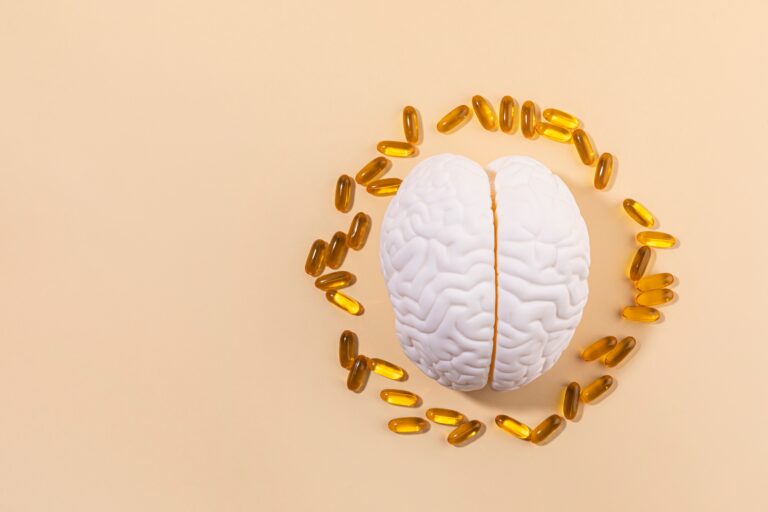Nutrition and Cognition
Nutrition and Cognition
Optimizing brain health and cognition includes balancing three key areas: nutrition, building new cells, and breaking down old connections. While the average person does not have direct, conscious control over how the brain creates new and retires old, the diet is a key tool in maintaining whole-body health, including cognition. Nutrition plays a major role in both physical health and mental health, a role that is particularly evident in the context of the brain. Supporting brain function may include memory, attention, concentration, and energy levels.
Vital Ingredients for Healthy Brain Function
With brain health and cognition, optimizing function includes supporting healthy levels of oxygen and fuel (glucose, lactate), as well as supporting healthy circulation and mitochondria for energy.
Oxygen
The brain is the body’s center of communication, and with proper access to oxygen, the brain is best positioned to function optimally. The amount of oxygen in the brain, and in the entire body, is dependent on breathing rates, blood circulation, and a protein in blood called hemoglobin – which is responsible for carrying oxygen throughout the body. Lifestyle habits like physical activity can increase oxygenation in the body; additionally, taking deep breaths, meditating, and potentially being around plants on a regular basis can help improve oxygen levels in the body and in the brain.1
Fuel
Glucose is the primary and preferred energy source in the body, and it is important for the brain in particular because it influences memory, concentration, and energy levels. Steady, consistent delivery rates for glucose paired with healthy circulation are among the best conditions for brain function.
Unstable blood glucose levels may result in hypoglycemia (low blood glucose), potentially leading to symptoms like fatigue, memory issues, irritability, poor concentration, and quick irritability. Panic attacks and anxiety have also been connected to varying blood glucose levels or reactive hypoglycemia.2,3 In addition, Alzheimer’s disease has often been referred to as “Type III diabetes” because some Alzheimer’s patients develop insulin resistance.
Lactate is another key metabolite important for brain health and cognition. Secondary to glucose, the brain can use lactate as an energy source to fuel brain metabolism, and it may also act as a signaling molecule in the brain.4 Lactate is formed from the breakdown of lactic acid, which is a byproduct of anaerobic metabolism – the production of energy in the absence of oxygen. From this breakdown, lactate is recycled for energy. Red blood cells produce lactic acid through anaerobic metabolism because they lack mitochondria and thus access to aerobic metabolism. Muscle cells, which have mitochondria, utilize both aerobic and anaerobic pathways of metabolism, being able to produce energy when oxygen is not readily available – such as during short, high intensity bursts of physical activity. Muscles generate the greatest amount of lactate, and the brain is one of a few organs that use it as fuel, along with the heart and the liver.4
Circulation
Circulation is another vital component of brain health and cognition – essential for the delivery of fuel to the brain. The brain doesn’t store oxygen and fuel like other body organs do, so keeping the flow of blood to the brain is a critical, 24/7 job. The adult brain uses 20 to 25 percent of the calories consumed through food in the diet for regular function (more so in children and at birth), so it is imperative that those nutrients are circulated and delivered on a regular schedule for optimal brain performance. Gingko (Ginkgo biloba) is a medicinal herb shown to increase blood flow velocity in small blood vessels, including those in the brain, as well as stabilize mitochondria.
The Brain: Always Under Construction
The brain is constantly growing and changing. Every day, the brain adapts to learning new information, skills, and language as well as creating and storing memories. It does this by growing new neurons and microglia in addition to synaptic pruning, the targeted process of recycling functional synapses to promote overall brain health. This is similar to pruning older leaves and blooms from a plant to help the new buds grow. Experts estimate that as many as 86 billion neurons reside in the brain, each with countless connections to other neurons.5
The brain also undergoes construction through nerve growth factors (NGF), made by all nerves.6 NGFs have been shown to be helpful when addressing neuropathies, traumatic brain injury, and multiple sclerosis.7 Brain-derived neurotrophic factor (BDNF) is another brain factor that is vital for neuroplasticity and is associated with anti-inflammatory activity.8 BDNF has also been shown to help with anxiety and depression due to its anti-inflammatory properties.9
NGF and BDNF Support in the Diet
A handful of plants common in the diet as well as individual vitamins and minerals have been identified as supportive of brain function by promoting both NGF and BDNF.
- Mushrooms: Lion’s Mane (Hericium erinaceus) is a type of medicinal mushroom shown to stimulate NGF and increase brain plasticity, which allows the brain to adapt to change and a variety of stimuli.10 In addition, Lion’s Mane improves memory and has BDNF-like activity in the hippocampus, which supports memory.11
- Green Tea has shown to improve NGF function. Whole green tea extract may work better than certain isolated forms and has been proven to allow low levels of NGF to increase to 25 times higher.12
- Blueberries contain anthocyanins, which are known for their antidiabetic, anticancer, anti-inflammatory, antimicrobial, and anti-obesity properties.13 Specifically for the brain, one study found that anthocyanins raise BDNF levels to enhance memory.
Other herbs, vitamins, and foods shown to improve BDNF function:
- Extra virgin olive oil
- Rhodiola (Rhodiola rosea)
- Saffron (Crocus sativus)
- Magnolia
- Vitamin D
- Magnesium
- Zinc
BDNF levels may be suboptimal as a result of lifestyle choices and conditions such as a poor diet high in both sugar and fat, obesity, insulin resistance, excessive consumption of calories, poor sleep, stress, and smoking.14 Other herbs and nutrients shown to protect BDNF levels:
- Ginseng (Panax quinquefolium)
- Gotu Kola (Centella asiatica)
- Ashwagandha (Withania somnifera)
- Bacopa (Bacopa monnieri)
- Omega-3 fatty acids
- Cocoa
Maintaining a healthy, active lifestyle is essential for the body’s muscles, bones, organs, and especially the brain. Support the brain and the body daily by consuming a variety of fruits, vegetables, whole grains, herbs, and lean proteins, in addition to daily movement and mindful habits.
- Claudio L. (2011). Planting healthier indoor air. Environmental health perspectives, 119(10), A426–A427. https://doi.org/10.1289/ehp.119-a426
- McNay, E. (2015). Recurrent hypoglycemia increases anxiety and amygdala norepinephrine release during subsequent hypoglycemia. Frontiers in endocrinology, 6, 175.
- Aucoin, M., & Bhardwaj, S. (2016). Generalized anxiety disorder and hypoglycemia symptoms improved with diet modification. Case reports in psychiatry, 2016.
- Riske, L., Thomas, R. K., Baker, G. B., & Dursun, S. M. (2017). Lactate in the brain: an update on its relevance to brain energy, neurons, glia and panic disorder. Therapeutic advances in psychopharmacology, 7(2), 85–89. https://doi.org/10.1177/2045125316675579
- Voytek, B. (2013). Are there really as many neurons in the human brain as stars in the milky way?. Obtenido de Nature
- Aloe, L., Rocco, M. L., Bianchi, P., & Manni, L. (2012). Nerve growth factor: from the early discoveries to the potential clinical use. Journal of translational medicine, 10(1), 1-15.
- Bisht, B., Darling, W. G., Shivapour, E. T., Lutgendorf, S. K., Snetselaar, L. G., Chenard, C. A., & Wahls, T. L. (2015). Multimodal intervention improves fatigue and quality of life in subjects with progressive multiple sclerosis: a pilot study. Degenerative neurological and neuromuscular disease, 5, 19.
- Cunha, C., Brambilla, R., & Thomas, K. L. (2010). A simple role for BDNF in learning and memory?. Frontiers in molecular neuroscience, 3, 1.
- Chagnon, Y. C., Potvin, O., Hudon, C., & Préville, M. (2015). DNA methylation and single nucleotide variants in the brain-derived neurotrophic factor (BDNF) and oxytocin receptor (OXTR) genes are associated with anxiety/depression in older women. Frontiers in genetics, 6, 230.
- Lai, P. L., Naidu, M., Sabaratnam, V., Wong, K. H., David, R. P., Kuppusamy, U. R., … & Malek, S. N. A. (2013). Neurotrophic properties of the Lion’s mane medicinal mushroom, Hericium erinaceus (Higher Basidiomycetes) from Malaysia. International journal of medicinal mushrooms, 15(6).
- Martínez-Mármol, R., Chai, Y., Khan, Z., Kim, S. B., Hong, S. M., Gormal, R., … & Meunier, F. A. (2020). Hericerin derivatives from Hericium erinaceus exert BDNF-like neurotrophic activity in central hippocampal neurons and enhance memory. bioRxiv.
- Gundimeda, U., McNeill, T. H., Schiffman, J. E., Hinton, D. R., & Gopalakrishna, R. (2010). Green tea polyphenols potentiate the action of nerve growth factor to induce neuritogenesis: possible role of reactive oxygen species. Journal of neuroscience research, 88(16), 3644-3655.
- He, K., Li, X., Chen, X., Ye, X., Huang, J., Jin, Y., Li, P., Deng, Y., Jin, Q., Shi, Q., & Shu, H. (2011). Evaluation of antidiabetic potential of selected traditional Chinese medicines in STZ-induced diabetic mice. Journal of ethnopharmacology, 137(3), 1135–1142. https://doi.org/10.1016/j.jep.2011.07.033
- Gomez-Pinilla, F. (2008). The influences of diet and exercise on mental health through hormesis. Ageing research reviews, 7(1), 49-62.







